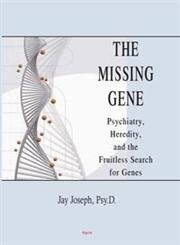The Missing Gene: Psychiatry, Heredity, and the Fruitless Search for Genes - Softcover

This timely, challenging book provides a much-needed critical appraisal of the evidence cited in support of genetic theories of psychiatric disorders, which hold that these disorders are caused by an inherited genetic predisposition in combination with environmental agents or events. In fact, the field of psychiatric genetics is approaching the crisis stage due to the continuing failure, despite years of concerted worldwide efforts, to identify genes presumed to underlie most mental disorders.
The belief that such genes exist is based on studies of families, twins, and adoptees. However, the author shows that these studies provide little if any scientifically acceptable evidence in support of genetics. In fact, researchers initial "discoveries" are rarely replicated. As this becomes more understood, and as fruitless gene finding efforts continue to pile up, we may well be headed towards a paradigm shift in psychiatry away from genetic and biological explanations of mental disorders, and towards a greater understanding of how family, social, and political environments contribute to human psychological distress. Indeed, Kenneth Kendler, a leading twin researcher and psychiatric geneticist for over two decades, wrote in a 2005 edition of The American Journal of Psychiatry that the "strong, clear, and direct causal relationship implied by the concept of a gene for ... does not exist for psychiatric disorders. Although we may wish it to be true, we do not have and are not likely to ever discover genes for psychiatric illness."
The author devotes individual chapters to ADHD, autism, and bipolar disorder. Looking specifically at autism, despite the near-unanimous opinion that it has an important genetic component, the evidence cited in support of this position is stunningly weak. It consists mainly of family studies, which cannot disentangle the potential influences of genes and environment, and four small methodologically flawed twin studies whose results can be explained by non-genetic factors. Not surprisingly, then, years of efforts to find "autism genes" have come up empty.
This is an important book because theories based on genetic research are having a profound impact on both scientific and public thinking, as well as on social policy decisions. In addition, genetic theories influence the types of clinical treatments received by people diagnosed with psychiatric disorders. Yet, as the author demonstrates, these theories do not stand up to critical examination.
"synopsis" may belong to another edition of this title.
Around the same time, Ronald Kessler and his colleagues published a study in the prestigious Archives of General Psychiatry in which they concluded that "about half of Americans will meet the criteria for a DSM-IV disorder [Fourth Edition of the American Psychiatric Association’s Diagnostic and Statistical Manual of Mental Disorders] sometime in their life, with first onset usually in childhood or early adolescence." Critics, of course, could explain this finding on the basis of the DSM’s tendency to label a wide range of subjective states and deviant behavior as "mental disorders." The authors of the DSM-IV seem to be saying to us (with apologies to comedian George Carlin), "You are all diseased."
But suppose that Kessler, et al., despite whatever flaws their study may have contained, did show that a sizable portion of Americans will experience some level of chronic or acute psychological dysfunction or distress during their lifetimes. Having established this, the question remains open whether the causes are mainly biological, or whether they reflect the impact of a wide range of psychologically harmful environmental influences that people experience in American society.
An important pillar of the biological argument is genetic theory, which holds that most people diagnosed with psychiatric disorders are genetically predisposed to manifest these disorders. However, if 50% of Americans will develop a genetically-based mental disorder, according to genetic theory a sizable percentage of the 50% who do not develop a mental disorder nevertheless carry pathological genes. Thus, according to the logic of the American Psychiatric Association’s Diagnostic and Statistical Manual of Mental Disorders, and currently ascendant theories of genetic causation, a sizable majority of Americans carry pathological genes predisposing them to mental disorders.
Or, perhaps not. In this book, I assess the surprisingly shaky foundations of genetic theories in psychiatry in the context of the current crisis in psychiatric molecular genetic research. It was expected that genes for the major psychiatric disorders would have been found by now. However, they have not been found. Indeed, a prominent genetic researcher could write in the July, 2005 edition of the American Journal of Psychiatry as follows: "The strong, clear, and direct causal relationship implied by the concept of ‘a gene for ...’ does not exist for psychiatric disorders. Although we may wish it to be true, we do not have and are not likely to ever discover ‘genes for’ psychiatric illness." It remains to be seen whether statements such as this will lead to the abandonment of gene searches for psychiatric disorders in the near future.
A belief in the hereditary basis of mental disorders is a very old one. In this book I will show that, following a critical reading of the scientific literature, this age-old belief has little evidence in its favor.
"About this title" may belong to another edition of this title.
- PublisherAlgora Publishing
- Publication date2005
- ISBN 10 0875864104
- ISBN 13 9780875864105
- BindingPaperback
- Number of pages332
Buy New
Learn more about this copy
Shipping:
FREE
Within U.S.A.
Top Search Results from the AbeBooks Marketplace
The Missing Gene: Psychiatry, Heredity, and the Fruitless Search for Genes
Book Description Condition: New. Book is in NEW condition. Seller Inventory # 0875864104-2-1
The Missing Gene: Psychiatry, Heredity, and the Fruitless Search for Genes
Book Description Condition: New. New! This book is in the same immaculate condition as when it was published. Seller Inventory # 353-0875864104-new
The Missing Gene: Psychiatry, Heredity, And the Fruitless Search for Genes
Book Description Paperback. Condition: Brand New. 332 pages. 8.75x6.00x0.87 inches. In Stock. Seller Inventory # zk0875864104

